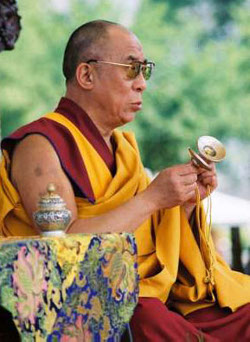 His Holiness the Dalai Lama
His Holiness the Dalai Lama
His Holiness the 14th Dalai Lama, Tenzin Gyatso, is the spiritual leader of Tibet.
Since the Chinese invasion of 1959, the Dalai Lama has continuously initiated a process of peaceful dialogue and negotiation with Chinese officials.
In 1979, he announced a “Middle Way Approach” to resolve the Tibetan issue in consideration of the interest of both the Tibetans and the Chinese people. For his strong stance of non-violence, the Dalai Lama won the Nobel Peace Prize, joining fellow social justice pioneers including Mahatma Gandhi, Martin Luther King, Jr., Nelson Mandela.
As early as in 1960, the Dalai Lama had repeatedly stressed that in the process of democratization of the Tibetan government in-exile he would have devolved his political powers to an elected leadership in order to continue the democratic process and make Tibetans self-reliant. As a consequence, in March 2011 the Dalai Lama stepped down from his political authority and devolved his political powers to an elected leadership after democratic and transparent elections were carried out among the Tibetan diaspora.
The Kalon Tripa and the Kalons
The Kalon Tripa is the Head of the Kashag (the highest executive office in the Tibetan Central Administration in Dharamsala), which is composed by Kalons (ministries) handling different portfolios. Each Kalon is the head of a department according to his/her functions. Currently there are 7 departments: Religion and Culture; Home; Finance; Education; Security; Information and International Relations; Health.
Executive: 14th Kashag
- Kalon Tripa Dr. Lobsang Sangay – Department of Education
- Kalon Pema Chhinjor – Department of Religion and Culture
- Kalon Dolma Gyari (Mrs.) – Department of Home
- Kalon Tsering Dhundup – Department of Finance
- Kalon Ngodup Dongchung – Department of Security
- Kalon Dicki Chhoyang (Ms.) – Department of Information and International Relations
- Kalon Tsering Wangchuk – Department of Health
The Tibetan Parliament in Exile (TPiE)
The Tibetan Parliament in Exile (TPiE) is the unicameral and highest legislative organ of the Central Tibetan Administration. Today, the Parliament consists of 44 members. Ten members each from U-Tsang, Do-tod and Do-med, the three traditional provinces of Tibet, while the four schools of Tibetan Buddhism and the traditional Bon faith elect two members each. Four members are elected by Tibetans in the west: two from Europe, one from North America and one from Canada. The Tibetan Parliament-in-Exile is headed by a Speaker and a Deputy Speaker, who are elected by the members amongst themselves. Any Tibetan who has reached the age of 25 has the right to contest elections to the Parliament.
Legislature: 15th Tibetan Parliament-in-Exile
- Speaker – Penpa Tsering
- Deputy Speaker – Lopon Khenpo Sonam Tenphel
More information about CTA can be found here: http://tibet.net/